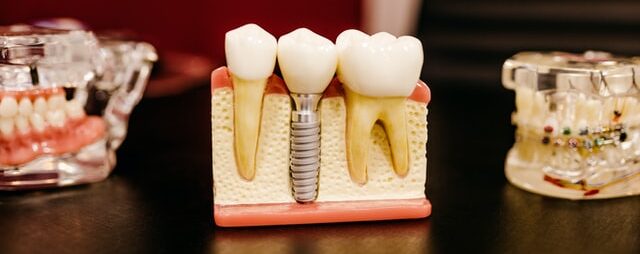Dental Implants
Dental implants are screw-shaped fixtures, typically made of a biocompatible titanium alloy, and are surgically placed in the jaw bone.Book Your Appointment
Who Needs A Dental Implant?
Dental implants are but one option available to patients that wish to replace one or more of their missing teeth. A thorough examination of the existing bone is conducted to ensure that there is enough bone structure present to retain an implant.
We also ensure that the patient is in good health – conditions such as but not limited to uncontrolled hypertension, poorly managed diabetes, tobacco use and osteoporosis decrease the likelihood of successfully retaining the implant.
Once the decision as been made to proceed, a medical-grade titanium implant fixture is surgically placed into the jawbone which eventually achieves osseointegration. (Osseointegration is defined as a direct structural and functional connection between ordered, living bone and the surface of a load-carrying implant). This allows for a durable and strong anchor for the dental restoration that will be placed on top.
How Much Do Dental Implants Cost In Alberta?
- The type of implant used
- The location of the implant
- The dental implant material used
- The amount of coverage provided by your dental insurance
Are You Eligible For Dental Implants?
You should seek the professional opinion of your dental care provider to determine if you are eligible for dental implants. You should also be aware of their history of and knowledge in dental implants. Depending on their training; getting referred to a specialist in periodontics or prosthodontics may be a better option to determine your eligibility.
If you are afflicted by certain medical conditions; such as active diabetes, cancer, or periodontal disease, you may require additional treatment before a procedure is implemented.
Smoking is another issue that can prevent dental implants from being a viable solution. If you are a smoker, your dentist may ask you to quit smoking, smoking is very damaging to your oral health and can decrease the likely hood of a successful implant.
What Is The Success Rate Of Dental Implants?
Dental implants are easily the most successful oral surgery performed in dentistry. The success rate typically is at or above 90% for both lower and upper jaw implants! The upper jaw is slightly less (but only about 5%) successful than the lower jaw as it is less dense. This decrease in density means it is typically harder to perform the procedure of the implant.
What Are The Risks Of Dental Implants?
There are some risks that may cause the failure of the dental implants even though these failures as stated before; only account for about 5-10% of all dental implants.
Here are some reasons that failure may occur:
- Poor positioning of the implant
- Possible infection of the implant area
- Loosening of the crown on top of the implant
If you have poor oral health, or pick up habits that lead to poor oral health (such as smoking), you may be at risk for peri-implantitis impacting the dental area. Peri-implantitis is similar to periodontitis (severe gum disease).

What are dental implants made of?
Dental implants typically have these 3 parts:
- The implant – A screw-like fixture that acts as a root for your new tooth/teeth. This osseointegrates (connects and attaches) to your jaw bone permanently.
- The abutment – A permanent connector that holds and supports a tooth restoration.
- The crown or prosthetic tooth – This is the part of the tooth that is visible. It is usually made of porcelain, zirconia or porcelain fused to a metal substructure which helps to achieve appealing esthetics and durability.
- Dental implants are quickly becoming the preferred way to replace missing teeth. The dentists at Smiles Dental Group are trained and equipped to discuss your teeth replacement needs.
What Is Bone Grafting?
There are different bone grafting procedures available to support implant placement. The most common is the ‘socket preservation bone graft, which occurs after a dentist extracts the tooth. The dentist then places bone grafting material (usually in granular form) in the tooth socket, the collagen barrier is placed on top to prevent gum tissue from growing into the socket. Sutures are placed and then bone generation and healing will take 4 to 6 months, after which the dentist will install an implant.
Frequently Asked Questions
The “best” implant will depend entirely on the situation. We recommend calling our clinic to schedule a consultation
Generally no, patients are given drugs to sedate them, and alleviate the pain. You may feel some discomfort, but you shouldn’t feel pain.
No! Older patients are usually the demographic to receive dental implants. As long as you meet the structural requirements, age shouldn’t be an issue.
To check this, we highly recommend calling your provider.
